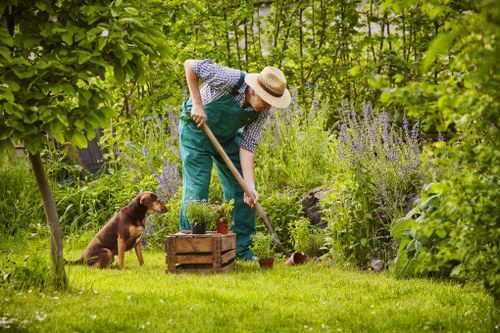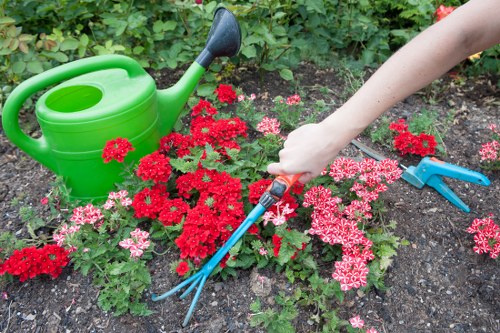Driveway Restoration in Thornton Heath: Revitalize Your Home’s Curb Appeal

Is your driveway showing signs of wear and tear? Driveway restoration in Thornton Heath can transform your home’s exterior, enhancing both its appearance and functionality. Whether you’re dealing with cracks, potholes, or general deterioration, restoring your driveway is a smart investment that can increase your property’s value and curb appeal.
Driveways endure harsh weather conditions, heavy traffic, and the natural aging process, leading to various issues over time. Ignoring these problems can result in more extensive and costly repairs down the line. By addressing driveway problems early, you can maintain a safe and attractive entrance to your home.
Restoring a driveway isn’t just about aesthetics; it also plays a crucial role in the overall functionality of your property. A well-maintained driveway ensures safe access for vehicles and pedestrians, reducing the risk of accidents caused by uneven surfaces or loose materials.

Why Choose Driveway Restoration?
Driveway restoration offers numerous benefits compared to a full replacement. It is often more cost-effective, allowing homeowners to achieve a fresh look without the expense of completely tearing out the existing driveway. Restoration methods can address multiple issues simultaneously, providing a comprehensive solution to common driveway problems.
Additionally, restoration is typically quicker and less disruptive than replacement. Homeowners can enjoy a renewed driveway without the lengthy process and inconvenience associated with full replacement projects. This makes driveway restoration an ideal choice for those looking to improve their property’s exterior with minimal hassle.
Environmentally, restoration is more sustainable as it reduces the need for new materials and lowers the overall carbon footprint. By maintaining and extending the life of your existing driveway, you contribute to eco-friendly practices that benefit the community and the planet.

The Driveway Restoration Process
Assessment and Planning
The first step in driveway restoration is a thorough assessment of the existing driveway. Professionals evaluate the extent of damage, including cracks, potholes, and surface irregularities. This assessment helps determine the most appropriate restoration techniques and materials needed to achieve the desired outcome.
Planning involves selecting the right restoration method based on the driveway’s condition and the homeowner’s preferences. Common restoration techniques include resurfacing, sealing, and crack repair. Each method has its advantages, and a professional can recommend the best approach for your specific situation.
Effective planning ensures that the restoration process is efficient and that the final result meets both functional and aesthetic expectations. Proper assessment and planning are critical to the success of any driveway restoration project.
Surface Preparation
Once the plan is in place, the next step is preparing the driveway’s surface. This involves cleaning the area thoroughly to remove dirt, debris, oil stains, and any loose materials. Surface preparation is essential for ensuring that the restoration materials adhere properly and provide a long-lasting finish.
Preparation may also include repairing any structural issues, such as filling large cracks or stabilizing uneven sections. Addressing these problems early on prevents further deterioration and ensures a smooth, even surface for the restoration materials.
Proper surface preparation sets the foundation for a successful restoration, enhancing the overall durability and appearance of the driveway.

Common Driveway Restoration Techniques
Resurfacing
Resurfacing involves applying a new layer of material over the existing driveway. This process can effectively cover up cracks, potholes, and surface imperfections, providing a fresh and uniform appearance. Resurfacing is a popular choice for homeowners looking to update their driveway without the cost of full replacement.
Materials used for resurfacing include asphalt, concrete, and resin-bound solutions. Each material has its unique benefits, and the choice depends on the homeowner’s preferences and the driveway’s current condition.
Resurfacing not only improves the visual appeal of your driveway but also enhances its durability, extending its lifespan significantly.
Sealing
Sealing involves applying a protective layer over the driveway to shield it from the elements. This process prevents water infiltration, UV damage, and the growth of weeds in cracks. Sealing is an effective way to maintain the driveway’s integrity and appearance over time.
Sealants come in various types, including acrylic, epoxy, and polyurethane. Each type offers different levels of protection and finishes, allowing homeowners to choose the one that best suits their needs.
Regular sealing can significantly prolong the life of your driveway, reducing the need for frequent repairs and restorations.

Choosing the Right Driveway Restoration Service in Thornton Heath
Selecting a reputable and experienced driveway restoration service is crucial for achieving the best results. Look for companies with positive reviews, a strong portfolio of completed projects, and knowledgeable staff who can provide expert advice and recommendations.
It’s also important to ensure that the service provider uses high-quality materials and follows industry best practices. This guarantees that the restoration will not only look great but also stand the test of time.
Additionally, consider obtaining multiple quotes and comparing them to find a service that offers the best value for your investment. Transparent pricing and clear communication are key factors in choosing the right restoration company.
Cost of Driveway Restoration
The cost of driveway restoration in Thornton Heath varies depending on several factors, including the size of the driveway, the extent of damage, and the chosen restoration method. Generally, restoration is more affordable than a complete driveway replacement, making it an attractive option for many homeowners.
Resurfacing typically ranges from £30 to £60 per square meter, while sealing costs can vary between £10 and £20 per square meter. Crack repairs and other minor fixes usually incur additional costs, but these are still lower than the expense of full replacement.
Investing in driveway restoration not only saves money in the short term but also prevents more significant expenses in the future by addressing issues early on.
Benefits of Driveway Restoration
- Enhanced Curb Appeal: A well-restored driveway significantly improves the overall look of your property.
- Increased Property Value: Investing in restoration can boost your home's market value.
- Improved Safety: Restored driveways are free from hazards like cracks and potholes, reducing the risk of accidents.
- Cost-Effective: Restoration is generally less expensive than full driveway replacement.
- Environmental Impact: Restoring your driveway is more sustainable than replacing it, as it reduces waste and the need for new materials.
Maintenance Tips for a Lasting Driveway
Proper maintenance is essential for preserving the condition of your driveway and extending the life of the restoration work. Regular cleaning, prompt repair of any new cracks or damages, and periodic sealing are key practices to keep your driveway in top shape.
Avoid using harsh chemicals or de-icing salts that can damage the driveway surface. Instead, opt for environmentally friendly cleaning solutions and products designed for driveway care.
Additionally, managing vegetation growth around the driveway can prevent roots from causing further damage. Regularly trim any plants or trees near the driveway to maintain clear and accessible paths.
Local Expertise: Serving Thornton Heath and Surrounding Areas
Driveway restoration in Thornton Heath isn’t just about the main town; the expertise extends to several surrounding areas, each with its unique characteristics and needs. Serving nearby neighborhoods ensures that homeowners across the region can benefit from professional restoration services.
Areas Near Thornton Heath
- Colliers Wood: Known for its leafy streets and family-friendly atmosphere, Colliers Wood residents benefit from driveway restoration services that cater to both modern and traditional home styles.
- Elmers End: This area features a mix of residential properties, making driveway restoration versatile to suit different architectural designs.
- Mead Vale: With a variety of housing options, Mead Vale homeowners can rely on specialized restoration techniques tailored to their specific driveway materials.
- Lower Morden: Lower Morden offers a blend of urban and suburban driveways, requiring adaptable restoration solutions to meet diverse needs.
- South Norwood: South Norwood’s vibrant community enjoys high-quality driveway restoration services that enhance the aesthetic appeal of local homes.
- Kew Green: Known for its peaceful environment, Kew Green homeowners appreciate eco-friendly restoration options that align with their values.
- Selhurst: Selhurst combines residential and commercial properties, allowing for comprehensive driveway restoration services that address varied requirements.
- Springbrook Road: This area benefits from personalized driveway restoration services that take into account the unique layout and design of each property.
- West Thornton Heath: West Thornton Heath residents have access to expert restoration services that ensure long-lasting and visually appealing driveways.
- Hayes: Hayes homeowners can enhance their curb appeal with driveway restoration tailored to the specific climate and environmental factors of the area.
- Monks Orchard: Monks Orchard offers driveway restoration solutions that blend seamlessly with the area’s established and charming residences.
- Kirkdale: Kirkdale’s diverse housing styles are well-served by restoration professionals who can adapt their techniques to suit any driveway type.
- Pollards Hill: Pollards Hill residents enjoy driveway restoration services that prioritize durability and aesthetic harmony with the surrounding landscape.
- Shortlands: Shortlands benefits from driveway restoration providers who understand the local architectural trends and material preferences.
- Belmont: Belmont homeowners appreciate driveway restoration options that offer both functionality and stylish finishes to match their homes.
Choosing the Right Materials for Your Driveway Restoration
Selecting the appropriate materials is crucial for a successful driveway restoration. The choice depends on factors such as the existing driveway material, budget, and desired appearance. Common materials used in restoration include asphalt, concrete, and resin-bound surfaces.
Asphalt: Asphalt is a popular choice due to its durability and ease of maintenance. It provides a smooth surface that can be resurfaced or sealed to enhance its lifespan.
Concrete: Concrete driveways offer a long-lasting and aesthetically pleasing option. They can be stained or textured to achieve various looks, making them versatile for different home styles.
Resin-Bound: Resin-bound driveways are known for their decorative appeal and permeability. They allow water to drain through, reducing the risk of puddles and ice formation.
Impact of Weather on Driveway Longevity
Weather conditions play a significant role in the wear and tear of driveways. Extreme temperatures, heavy rainfall, and frost can all contribute to the deterioration of driveway surfaces. Proper restoration addresses these issues by reinforcing the driveway and applying protective layers to withstand harsh weather.
In Thornton Heath, where the climate can vary, choosing weather-resistant materials and restoration methods is essential for ensuring the driveway remains in good condition year-round.
Regular maintenance and timely restoration work help mitigate the impact of weather, preserving the driveway’s functionality and appearance over time.
Environmental Considerations in Driveway Restoration
Eco-friendly driveway restoration practices are becoming increasingly important. Opting for sustainable materials and methods minimizes the environmental impact and promotes responsible resource usage.
Resin-bound driveways, for example, are permeable and allow rainwater to seep through, reducing runoff and helping to prevent flooding. Additionally, using recycled materials for restoration projects further supports environmental sustainability.
By choosing environmentally conscious restoration options, homeowners contribute to a greener community while enjoying the benefits of a beautifully maintained driveway.
Conclusion
Driveway restoration in Thornton Heath is an effective way to enhance your home’s curb appeal, increase property value, and ensure safe and functional access. By choosing the right restoration techniques and materials, and maintaining your driveway properly, you can enjoy a beautiful and durable driveway for years to come.
Frequently Asked Questions
1. How long does driveway restoration take?
Driveway restoration typically takes a few days to complete, depending on the size of the driveway and the extent of the work required. Simple resurfacing projects can be finished quickly, while more complex restorations may take longer.
2. Can I restore my driveway myself?
While some minor repairs can be done by homeowners, it’s generally recommended to hire professional driveway restoration services. Professionals have the expertise and equipment necessary to ensure a high-quality and long-lasting restoration.
3. How much does driveway restoration cost in Thornton Heath?
The cost varies based on factors like driveway size, condition, and chosen materials. On average, driveway resurfacing ranges from £30 to £60 per square meter, while sealing costs between £10 and £20 per square meter.
4. What materials are best for driveway restoration?
The best materials depend on your specific needs and preferences. Common options include asphalt for durability, concrete for a clean look, and resin-bound surfaces for decorative and permeable benefits.
5. How can I maintain my restored driveway?
Regular maintenance includes cleaning the driveway, promptly repairing any new cracks or damages, and applying sealant periodically. Avoid using harsh chemicals and manage vegetation growth around the driveway to keep it in good condition.


